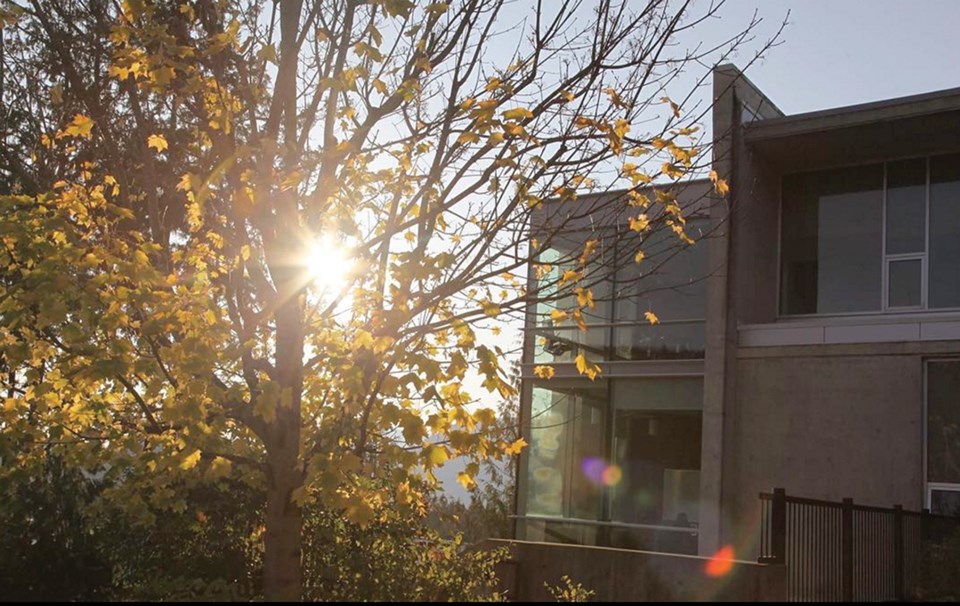Quest University students expressed concern about the potential for a conflict of interest during a public information meeting on Nov. 6 at the school regarding the university’s application to subdivide some of its land.
The school is proposing to split its land into thirds, so as to make it more accommodating to potential developers.
Quest has presented the subdivision as a way to raise needed funds and attract investment.
But over the course of the meeting, students began raising questions about one corporation’s influence over the process.
Bethel Corporation is acting as the school’s consultant for the land subdivision.
Two members of that development company — owner Michael Hutchison and its chief financial officer, David Fujimagari — sit on Quest’s seven-person board of governors.
The company also owns several of Quest’s student residences, Fujimagari told The Chief after the meeting.
The Ossa and Red Tusk buildings are owned by Bethel, but are on an agreement that will eventually see the student housing given to the university, he said.
Furthermore, Bethel also owns the Riverside, Four Winds and Swift Creek student housing buildings, as well as the land they are built on, Fujimagari added.
Some of the dozens of Quest students present during the public gathering expressed concern over about a potential conflict of interest.
George Iwama, president of Quest University, said in response that Bethel would not place its interests ahead of the school’s.
Iwama added the company was not being paid for its help.
“We lack the capacity in-house to do all we want to do, and we’re getting the help of David [Fujimagari] and Caroline [Lamont] in assisting us with this application,” Iwama replied, mentioning the two Bethel representatives present at the meeting.
This exchange preempted several concerns from students in the audience.
“[Bethel has] two…seats on the finance and audit committee, which controls financial reporting, informational technology and general financial oversight for the university,” said Nate McCarthy, the visual director for the school’s paper, The Mark. “As well, the company has developed some of our residences on campus.”
Quest’s website states that the finance and audit committee includes three people, with Fujimagari and Hutchison being among them.
“I think when you have two members of one corporation who have large financial weight on the university, I question the ethics of why they would be in control of our financing,” McCarthy continued.
In response, Iwama said that it’s been a difficult financial year for the university.
Finance committee members were chosen to provide much-needed advice to help the school manage its cash problems, he said.
Iwama acknowledged that it’s rare for university board members to be as involved in the day-to-day operations the way Quest’s board was this year, but it was necessary in this case.
He added the weekly work done by board members is uncompensated and while Bethel representatives sit on the finance committee, motions and decisions still need the approval of the full board, which is made up of seven, including Iwama.
Furthermore, he said concerns about possible conflicts of interest have been brought to the school’s attention, and Quest will work to add more members to the board.
“That’s the situation we have, and you’re quite justified in holding such opinions, but I think you’ll start to see some change rather in short order,” Iwama said.
When asked by an audience member if Bethel could bid on Quest’s land, given that two board members work for the development company, Fujimagari said that whenever the board considers something involving Bethel, he and Hutchison recuse themselves from voting.
“We have to go stand outside in the hall,” he added.
He said no companies have made any proposals for the land.
“In terms of, ‘Could we be potentially be participating with the university going forward?’ Yeah, for sure,” said Fujimagari. “We have in the past. Ossa and Red Tusk are two...projects that we’ve done with the university.”
He said the company owns those two student-housing buildings for the moment because Bethel agreed to get things set up. As of now, Bethel owns those buildings, but Quest owns the land. When the 25-year arrangement expires, Quest will own both the buildings and the land on which they stand.
“It doesn’t do anyone any good if we allow someone to come in, make a bunch of money off the university and then close it in two years,” Fujimagari said. “It wouldn’t even help whoever that developer may be.”
Fujimagari emphasized that he was deeply invested in the university’s success and added he wanted it to still be around “100 years” from now.
There was also some discussion about the university’s sub-area plan.
The sub-area plan is a document that outlines the development goals for the university.
It states that at final buildout, Quest must be able to accommodate 1,200 students. In addition, 52 acres of land should be zoned for campus-related uses.
Caroline Lamont of Bethel said that 52 acres are zoned as UC-1, which means it’s been set aside for campus-related uses.
This is consistent with the sub-area plan, she said.
“Right now, it is in compliance with that,” Lamont continued.
“And that, I think, is very important for Quest to have that in there.”
Over time, there have been some flex uses for the land, but that was to look at more amenities for the student body, she said.



